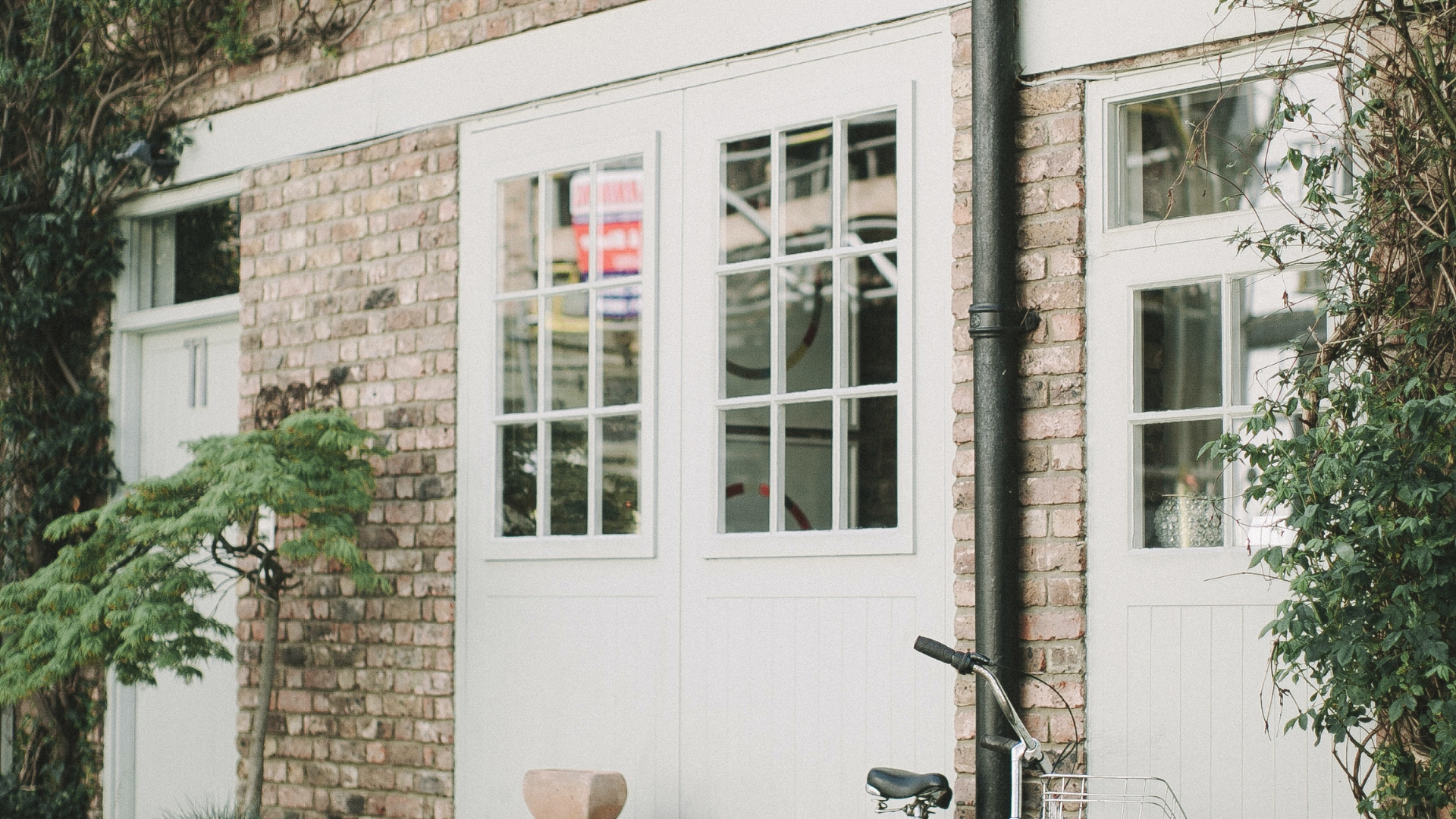Not sure on the process for buying a house? Here are 11 steps (and top tips) for buying a house that you must know.

Buying a house is super exciting, but it can also feel really overwhelming if you don’t know where to start or what the process is.
We’ll cover 11 key steps for buying a house so you know exactly what to do, in addition to some top tips to help you avoid common mistakes. The 11 steps are:
1) DECIDE TO BUY
2.) FIND A PROPERTY
3.) MAKE AN OFFER
4.) OFFER ACCEPTED SUBJECT TO CONTRACT
5.) ARRANGE SURVEY AND INSPECTIONS
6.) ARRANGE A CONVEYANCING SOLICITOR
7.) UNDERSTAND YOUR CONTRACT
8.) EXCHANGE DATE
9.) GET EVERYTHING READY TO MOVE
10.) COMPLETION DATE
11.) ENJOY YOUR NEW HOME
These steps are for buying a house without a mortgage. Whilst the process will be similar if you’re getting a mortgage, it’s not exactly the same, so we thought best to keep it separate!
This post is all about 11 steps (and top tips) for buying a house that you must know.
STEP 1: Decide To Buy
You first want to make sure that you’re definitely making the right decision when it comes to buying. To help you decide, you can view our posts on:
- 15 Top Reasons for Moving House You Should Consider
- Costs Of Buying A House That You Must Budget For
You’ll need to make sure your finances are in order and that you’ve considered all the costs of buying a property.
STEP 2: Find A Property

Online search
Once you have an idea of the type of home you’re looking for, you can start looking on various sites, such as Zoopla and Rightmove, to help find your home.
It’s always worth getting a few properties lined up rather than having your heart set on just one. Make sure to keep an open mind and don't dismiss a property just because you don't like one tiny aspect of it!Contact the estate agent
The estate agent acts as the go-between for you and the seller. They will help arrange house viewings and pass on any offers you make to the seller. You do not need to pay anything for using an estate agent.
House Viewings
For a full list of questions and certificates to ask for, you can view our ultimate house viewing checklist with 101+ questions to find your dream home.
STEP 3: Make An Offer

Once you're interested in buying the property, put an offer in through the estate agent. This is where you say how much you’d be willing to pay for the property.
Remember you can negotiate, so you don’t have to offer the full asking price. We'll have a new post on negotiating coming very soon!
The estate agent will pass your offer onto the seller, who will either accept your offer or make a counter-offer. You may then have a bit of back and forth until you reach an agreed price.
Step 4: Offer Accepted Subject To Contract
If the seller wants to accept your offer, the estate agent emails you confirming this. However, you are under no legal obligation at this stage to buy the property given no contracts have been exchanged yet.
However, once your offer has been accepted, it's always worth asking the estate agent if they will pause further viewings or marketing of the propery whilst you get your paperwork in order. This might be acceptable to the seller, as they'll want to move forward with the process.
Step 5: Get A Survey And Inspections Arranged (optional but highly recommended)

Finding a surveyor
Once the offer is accepted, it is extremely important you get a chartered surveyor, which you can find on The Royal Institute of Chartered Surveyors. You will need to organise this, not the estate agent. Surveyors check if there are any underlying issues with the house and that it’s in good condition.
Getting a survey is optional and some people don't bother in order to save money. However, this is very risky. If there is something seriously wrong with the property, you'll have the hassle of resolving this once you’ve moved in. This could end up costing you significantly more in the long-run.
You should also check with your house insurance company whether they require you to get a house survey.
Different survey types
If you’re looking to save money, there are different types of surveys you can get, which are outlined on the RICS Home Surveys website. We recommend you read their article on ‘helping you choose the right survey.’
The Level 3 survey is the most comprehensive one, which includes looking at the structure of the property. You should get this done if the building is very old or you're planning to undertake building work.
Once the survey is complete, you will receive a surveyors report for your records. You should go through the report and consider whether you would still like to buy the property.Further inspections (optional)
In addition to the survey, you may wish to arrange other checks, such as an electrician, plumber or roofer to check these are all in working order.
Renegotiation
Depending on the results of the survey or any other inspections, you may wish to renegotiate with the seller.
It’s at this stage where quite a lot of offers fall through, which is why it’s essential to get a survey and not just hope that everything is ok !
Do not give a copy of your survey report to the seller. If you want to renegotiate the price due to many faults with the property, the seller may ask for evidence. In which case, just photocopy that part of the report for them to see.
Step 6: Arrange A Conveyancing Solicitor

A conveyancing solicitor sorts out all the legal aspects of buying a house. This includes:
- Drawing up contracts
- Undertaking various searches to see if anything may affect the property, such as checking if there are any planning applications for motorways. You should check with your solicitor the exact searches they’ll be doing, as they can undertake additional searches at your request (for an additional cost)
- Agreeing an exchange date and completion date with the seller’s solicitor (see below for definitions)
- Transferring the title deed in your name and registering you as the new owner with HM Land Registry. This document confirms the property belongs to you and is sorted at the end of the buying house process
You will need to give the solicitor your contact/personal details, proof of ID and details of the property you're intending to buy.
Top Tip
We recommend getting a surveyor's report
before you get a solicitor. If the surveyor finds something wrong with the property and you decide you don't want to buy it anymore, there would be no need to pay for a solicitor and incur legal fees.
Instead, you can call a solicitor in the meantime to give them notice, saying that you are thinking of purchasing and just waiting for the surveyor's report to come back. However, do not instruct them to do any searches yet, otherwise you’ll be charged !
If the surveyor’s report comes back all ok, your solicitor is ready to go.
Step 7: Understand Your Contract For Buying A House

Contract
The solicitor will draw up your contract, so it's very important you ask them to clarify any clauses you don't understand.
The contract will include the full address of the property, purchase price, date of exchange and completion, and other information you have agreed to. You should always check these details and make sure you are buying the correct property for the correct amount !
Check the TA10 form
The seller completes a TA10 form (also knows as fixtures and fittings form), which is part of the contract. This form outlines what is being left at the property. You should review this thoroughly and check that you're happy with everything in there.
Top Tip
Throughout the buying process, there will be various documents your solicitor will be giving you. We highly recommend keeping them safe and organised in a file. It's also good to print out hard copies just in case something goes wrong.
Step 8: Exchange Date For Buying A House
Definition
The exchange date is when the buyer and seller sign the contract. This date is agreed via your solicitor and the seller’s solicitor depending on when suits you both.
On the exchange date:
- Your solicitor and the seller’s solicitor will finalise the terms and conditions of the contract and share this with you
- You will sign the contract. Make sure you read the terms and conditions very carefully before signing and check that your concerns/requests have been reflected
- Your deposit, which is a certain percentage of the property’s price (usually 10%), must be with your solicitor. Your solicitor will then transfer your deposit to the seller’s solicitor, where it is held in a client’s account
We recommend transferring the deposit to your solicitor a couple of days before the exchange date just in case there are any delays in clearing funds.
Remember, if you pull out of the contract after the exchange date, you will lose your deposit.
Step 9: Get Everything Ready To Move

The contract you sign will specify the date you can move in. Once you have your moving date, make sure everything is lined up and ready to go for moving day.
- If you're using a removals company, confirm your final moving date with them. You can view our post on 21 Top Tips For Choosing The Best Removals Company
- Make sure you've confirmed your moving date with a storage company if you're using them. See our 5 Things You Must Know About Storage When Moving House post
- Set up home insurance (buildings and contents insurance) at least 2 days before completion date
- Start informing others of your change of address, including re-directing your mail
- If you would like any professional cleaning done and the locks changed when you move in, make sure you arrange this in advance
Top Tip
Get confirmation that the seller will definitely be out of the property by midday on the completion date (see below). Sometimes if the seller has underestimated the moving process, you could be hanging around for a while if you're moving in on the same day that they're moving out.
This will be problematic if you've arranged for the locksmith to show up at a certain time at the the new house, and the seller is still packing up their stuff !
Step 10: Completion Date For Buying A House

Completion date is where the property’s ownership is transferred to the buyer. The seller will have to move out by this date.
By completion day, you must ensure you have transferred funds to your solicitor for the following:
- Cash for the house (i.e remaining 90%), which your solicitor will then transfer to the seller’s solicitor. Once this is complete, you can get the keys to your new home, which you get from the estate agent or from the seller directly if you're at the house
- Payment for solicitor’s fees and disbursement charges (which includes transferring title deed cost)
- Stamp duty payment. This is a tax paid in the UK if you’re buying a property over a certain amount. You pay this via your solicitor, who will then pay to this Government on your behalf and give you a receipt
You usually pay the above costs to your solicitor as one lump sum. As above, we recommend paying the lump sum a couple days before completion date just in case there are any delays.
Top Tip
We highly recommend going to the property on completion day to check the state of the property and what condition the owner has left it in. The seller may agree to leave certain items/carpets etc, but you might show up to the property only to find they’ve all been ripped out ! What we always do is:
- Make the lump sum payment to the solicitor a couple days before completion date
- Specifically instruct the solicitor (in writing!) to hold off sending any payment to the seller’s solicitor until we give the ok
- Go to the property and check everything is ok
- Let the solicitor know they can release the money to the seller’s solicitor
- Once your solicitor pays the seller’s solicitor, you will get verbal confirmation from the estate agent and receive the keys (either from the estate agent or the buyer if you're at the property)
- Your solicitor will then submit your stamp duty payment and title deed transfer application
Step 11: Enjoy Your New Home

Congrats ! The hard part is over. Now you can relax and enjoy your new home 🙂 (let's ignore all the unpacking that needs to be done for now...)
This post was all about 11 steps (and top tips) for buying a house.
If you found this helpful, you can view our upcoming content on our coming soon page to see what's next !

Comments